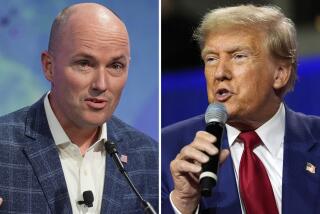An ironic twist in the tale of SEC’s Christopher Cox
- Share via
Christopher Cox is the kind of big-brain guy who’ll never want for a job. When you sport degrees from Harvard business and law schools, people find you. Throw in 17 years in Congress and a reputation as a courtly politician who makes friends instead of enemies, and you’re talking about someone who, even at 56, has long-term upside.
So weep not for Mr. Cox.
Still, few get out of this life unscathed. And at the moment, Cox is somewhere nursing his wounds after his departure 10 days ago as chairman of the Securities and Exchange Commission and, if he’s at all into irony, perhaps reflecting on the strange-but-true twist that’s now part of his biography.
How did he miss the signs that Wall Street was poised for its biggest meltdown in half a century?
We take you back to Orange County 1994, when bad investment decisions by treasurer Robert Citron, long seen as an investment wizard, resulted in the country’s largest municipal bankruptcy. The alarm-sounder then was John Moorlach, now a county supervisor but then Citron’s election opponent.
Moorlach’s campaign chairman was Congressman Chris Cox. And even if he wasn’t necessarily part of the brain trust that did the heavy lifting on the Citron record, Cox spoke out immediately afterward, touting Orange County’s essential financial soundness and counseling calm in the face of seeming calamity.
A year later, Cox was less measured. After the SEC decided not to levy fines or impose penalties on Orange County officials, Cox said: “The SEC is not just a day late and a dollar short -- they are two years late and $2 billion short.”
Point being, Cox was no babe in the woods when it came to the potentially illusory nature of unusually large Wall Street success.
But here we are in early 2009, at the end of Cox’s 3 1/2 -year run as SEC chairman, and the conservative Republican has been among those taking a public beating.
This week, Time magazine called the SEC “Washington’s most beleaguered agency.” It has been pilloried for not spotting the alleged long-running fraud of investment firm owner Bernard Madoff, as well as for laxity in its role as Wall Street watchdog at a time when the nation’s economy was foundering.
The book still is not written on Cox’s role. To be sure, many observers say it isn’t fair to blame him or the SEC for the widespread problems. Others are less charitable, saying Cox’s long-standing support of a deregulated market and friendliness to business made him the wrong SEC chairman at the wrong time.
I’m out of my element when it comes to high-flying finance, and I’m not here to defend or pile on Cox. But it’s impossible to miss the irony when stacking his intimate knowledge of Orange County’s financial failures next to the Wall Street fiascoes that coincided with his SEC reign.
Cox conceded that the SEC had missed red flags about Madoff, but took pains to note that they preceded his tenure on the commission. But he couldn’t explain how or why nobody sniffed out the apparent fraud. “The [Madoff] case is very troubling for that reason,” Cox told the Washington Post. “It’s what the SEC’s good at. And it’s inexplicable.”
In the main, though, he defended his SEC tenure: He was steady while others got rattled. The SEC didn’t shirk from its duties and acted when it could. His game plan was not to look the other way.
Although many agree with that, the critiques came in bipartisan waves. During John McCain’s presidential campaign, he called for Cox’s ouster. A Southern Republican congressman asked in the wake of the Madoff revelations: “If our nation’s top securities enforcement agency can’t uncover fraud of this magnitude, then what can they do?”
Historians will sort all this out.
Moorlach has watched Cox’s public lathering with a historical perspective more informed than most. “Chris Cox had so much potential,” he says. “Every time a bigger seat opened up, that is, the U.S. Senate, he’d always turn it down when we thought he had such potential. I was really excited when he was appointed to chair the SEC. Now it’s very sad.”
Because?
“He’s such a bright guy,” Moorlach says, “and if he could have been in front of some of these things, he’d have a great legacy.”
Moorlach says he doesn’t know if Cox felt hamstrung by the bureaucracy of the SEC or whether the specter of looming problems seemed so “unbelievable” that people discounted the potential peril. That’s how many people viewed the warnings about Citron’s risky investments, he says, with the prevailing view back then being: “That’s just impossible, so don’t worry about it.”
Moorlach laments that Cox didn’t use his SEC chairmanship as more of a bully pulpit, like former chief Arthur Levitt Jr. did. “He was screaming, sometimes rude, but he was out there,” Moorlach says of Levitt. “I didn’t see Chris Cox do that.”
Though Levitt might sometimes have overdone it, Moorlach says he’d hoped that Cox would have been more like former New York Atty. Gen. Eliot Spitzer, who, before a prostitution scandal ended his governorship, had forcefully taken on Wall Street excesses.
Moorlach says he doesn’t know what Cox’s plans are. Neither do officials at the county’s GOP headquarters. Moorlach insists he’s still viable for any major elective office in California. He also says he’s always thought Cox would be “a wonderful Supreme Court justice.”
Cox will surface. Maybe in public life, maybe in the private sector where he could make a small fortune.
Of the assorted disasters that engulfed Cox, Moorlach says: “Maybe he could have done a little more, but I certainly don’t hold him responsible for it. As a friend, I wish he could have finished strong. But all this stuff was tough.”
--


